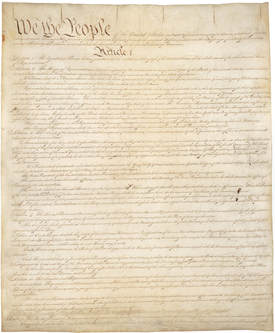
The preamble to the United States Constitution offers the purposes for which the founders created this framework for our government. These six purposes, then, are the yardstick by which we are to measure what our government is and what our government does. Proper attention to these six purposes will not prevent disagreement over how to achieve them for two main reasons. First, people can disagree about what measures will best achieve any one of the purposes. Second, people can disagree about the relative priority of measures aimed at achieving different purposes. Nonetheless, the purposes enumerated in the preamble create a set of boundary conditions that should guide our disagreements. The six purposes also offer a way to evaluate the performance of elected officials sworn "to support and defend the Constitution of the United States against all enemies, foreign and domestic."
The content of the purposes are important, but it is also very important that the founders chose to place the framework for our government squarely within the moral tradition wherein the "goodness" or "badness" of a thing is to be judged by its effectiveness in achieving a certain goal or end. The fancy philosophical term for this type of thinking is "teleological". Another way of judging the goodness or badness of a thing is by an appeal to the inherent nature of that thing. The fancy word for this alternative standard is "deontological." In the Declaration of Independence, when the founders cited natural law and stated that people were endowed by their Creator with "inalienable rights" that included life, liberty and the pursuit of happiness, they were appealing to a deontological standard.
I am not trying to suggest that one way of reasoning is better or worse. I do think it is important for citizens to recognize the difference. This is particularly true because the Constitution would not have been ratified without the commitment to pass the first ten amendments, collectively known as the Bill of Rights. And the first of those amendments guarantees freedom of religion. So the Constitution guarantees the equal protection of the law to everyone, even to people who do not believe in a "Creator." Atheists might still reason deontologically about human rights--they might simply argue that human beings have fundamental, inalienable rights because they are the kind of creatures who write constitutions.
If you can imagine a conversation between an atheist and a Christian who are both moral deontologists, you can see immediately that the two will differ on the source of the natural law from which our inalienable rights emerge. There is no such conflict when we shift to the teleological argument. Regardless of whether you believe in a Creator or not, you can agree that the purpose of government is to achieve the ends enumerated in the preamble to the Constitution,
without any appeal to why those ends are the right ends for any framework of government. In this sense, then, the teleological argument is the lowest common denominator for the people protected by our Constitution.
[1] From the Constitution as originally adopted, at http://lcweb2.loc.gov/ammem/amlaw/ac001/intro4.html

 RSS Feed
RSS Feed
